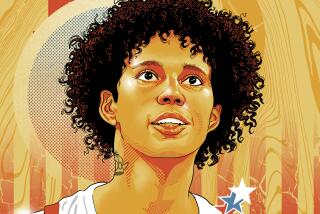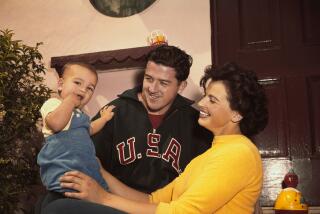Navratilova Czechs In on Her Past
- Share via
PRAGUE, Czechoslovakia — “Yurr, shurr,” Martina Navratilova said. More than a decade after leaving Czechoslovakia, there are still familiar Eastern European tails on her English words, remnants of her roots. “Yeah, sure” she was saying. She was very happy to be going home. Looking forward to it with all her heart.
It was England, July 13. She had just won her fifth straight Wimbledon women’s singles title. For a fortnight, Navratilova had wanted to concentrate on her matters at hand. Not on her past--in Czechoslovakia. Not on her future--in Czechoslovakia. Until the championship was won, she preferred to discuss only the present.
Now it was over. She had done it. And so, the question was put to her. Put to her precisely this way: “Martina, does it feel good to be going home now after being away for so long?”
She never missed a beat.
“Yeah, sure,” she said. “I’ve been gone a long time. I can’t wait to see my house again. See my dogs and my cats. I’ve been gone now for, oh, 2 1/2 months, so I’m anxious to. . . . “
And she kept on gabbing like that, about absence making the heart grow fonder and such, and it suddenly hit you like a forehand smash: She was talking about Texas. Fort Worth bloody Texas.
Either the forthcoming Federation Cup tennis tournament in Prague--city of her birth, land she left behind--was the furthest thing from her mind, or she was sidestepping the subject deliberately, or, likeliest of all, she honestly had given a word-association response. Having heard the word “home,” her brain registered America.
A little more than a week later, Martina Subertova, daughter of Miroslav and Jana Subert, stepdaughter of Mirek Navratil, girl who adopted her stepfather’s name at age 10, girl who visited America for the first time at 16, woman who became an American citizen at 24, came home at last.
She walked into the Stvanice tennis stadium Tuesday at a little past noon. The last time she had been to her homeland, this stadium did not even exist. Now there were Czechs compelled to pretend that Martina Navratilova, herself, did not exist.
Souvenir stands sold color photographs of all the top tennis players. From Ivan Lendl, national hero, to John McEnroe, American. From Hana Mandlikova, national heroine, to Zina Garrison, American. The women’s names were inscribed on the pictures. “Cris Evertova Lloydova,” was one. The feminine suffix “ova” is used by every Czech girl after her father’s name, and later after her husband’s.
There also were photos of Diego Maradona and Pele, and decals of Mickey Mouse and Donald Duck.
But no photo of Navratilova was for sale, under any name, anywhere in the stadium.
Hana Mandlikova had once mentioned that in Czechoslovakia, Navratilova’s tennis feats were ignored. They do not even print Navratilova’s results, she said. Persona non grata. But at Wimbledon this year, once she finally was encouraged to speak of her home of old, Navratilova vehemently denied it.
“I am not shunned there,” she said.
Now, the time had come to find out in person. Navratilova entered Court 1 at the Stvanice stadium Tuesday to play a young, pony-tailed girl from China, Li Xinyi. The dark-haired, chubby Czech who defected in 1975 had returned a bleached-blond, slender American.
There was applause. Much applause. Martina waved. No one in the 800-seat auditorium rose, but a ring of spectators five-deep formed behind the seated customers, high above the court, straining for a look.
Camera shutters clicked. If they could not buy a picture of her, they would take one.
Martina Navratilova was made to feel at home.
She actually had arrived three days earlier, to considerable fanfare, at the Ruzyne Airport at Prague. Not that the Czech press had heralded her arrival in any way.
Hearing by word of mouth alone, more than 200 citizens came to meet her plane. Also there was Cyril Suk, president of the Czech Tennis Federation and father of Helena Sukova, one of the country’s top players. It was raining, so Suk offered Navratilova his umbrella.
Navratilova went to her hometown of Revnice--pronounced Jev- neet- za--to visit the house of her childhood. The town was quaint and New England-like--with a village square and a backdrop of ski slopes. “My parents kept wanting to show me the new things. I kept wanting to see the old things, the things I remembered,” she said.
She wanted to go to the woods where she had picked mushrooms with her dad. To the mountains where they had skied. To the bakeries where they had bought fresh bread. And to the tennis court where she had learned to play.
“I kept pinching myself, wondering if all this was real,” she said. “Or am I dreaming?”
Her fantasy, she said, was to have returned to Czechoslovakia unannounced one day, take the train to Revnice, knock on the door and watch her parents’ jaws drop. “Sometimes the 11 years seem like a lifetime,” she said. “Other times, it feels like yesterday.
“I can’t deny where I came from. I mean, this is my homeland. But my home is in the States. I am an American.”
The next afternoon, Sunday, a Federation Cup opening ceremony was held at the stadium, complete with an Olympic-like parade of nations. Players from 42 countries filed into center court, where roughly two-thirds of 7,000 seats were occupied. As they entered, the loudest applause was saved for Navratilova.
There were brief welcoming addresses afterward, including one by Mandlikova, who accepted a trophy emblematic of Czechoslovakia’s 1985 Cup victory in Tokyo. She spoke Czech, except for one quick comment welcoming “the two best players in the world,” Navratilova and Evertova Lloydova.
Then the Czech anthem was played. Martina stood, sang and wept. “I still know it by heart,” she said later. “I told myself not to cry, but I don’t listen.”
It was an emotional experience, and all that remained was to actually play tennis. Navratilova checked into a hotel with the rest of the U.S. team and laughed at herself when she called room service and began to place her order in English, forgetting where she was.
On Tuesday, the four-woman American team--Navratilova, Lloydova, Garrisonova and Pamela Shriverova--opened play. Chris drew center court for No. 1 singles, because the tournament was being played on her specialty, clay.
Li Xinyi, 24, ranked 309th in the world, did not have much luck against Navratilova, the world’s best, but she did take a game off her, something to tell her grandchildren about. There was a funny moment early in the match, when Martina hit a forehand wide. Someone at courtside started cheering and applauding her mistake.
Amazed, Martina’s eyes darted to the sideline, trying to find out who would be against her in Prague. She quickly found out. It was Li Xinyi’s teammates. A gang of three.
Martina broke up.
She won the match in 40 minutes, 6-1, 6-0. Li came up to the net and asked a favor. Navratilova nodded. They walked to the sideline together and stood side by side. Li wanted a snapshot of them together for her scrapbook.
As Navratilova left the court to great applause, she blew a kiss.
“I wanted to play well today,” she said afterward. “I wanted to show these people what I can do.”
The crowd was with her all the way. “Yurr, shurr,” Martina said. “They were fantastic.” Faces and places. Memories. Everywhere Navratilova looked, there was something to remind her where she was, and who she was.
Someone made the mistake, though, of asking, point-blank, for whom she was playing.
“I played for the United States,” Martina Navratilova said. “I am an American.” She had sung the Czech anthem, but this was her pledge of allegiance.
More to Read
Go beyond the scoreboard
Get the latest on L.A.'s teams in the daily Sports Report newsletter.
You may occasionally receive promotional content from the Los Angeles Times.










